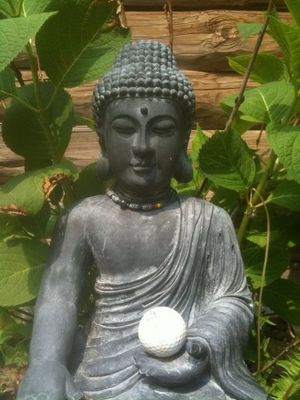Tiger Woods, the number one ranked golfer in the world, was
two shots from last place after the second day of play at the World Golf
Championship Bridgestone Invitational a tournament he has won seven times in
the past. In most tournaments he would have failed to make the cut and would
have gone home for the weekend, but everyone in this selective field played all
four days. Since his fall from grace and his declarations to re-avow his
currently ranked 80th on the money list (with less than a million dollars; last
year he won $10.5 million) and 111th on the Fed Ex Cup (a ten million dollar
prize he won last season). He is also at immanent risk of losing his ranking as
the number one golfer in the world after holding that distinction for 269
consecutive weeks. Tiger, the most famous athlete in the world, provided a
spectacular demonstration of the Three Poisons in action. His lust, lies, and
self-aggrandized delusion made headlines around the world. In April upon
returning to competitive golf, he said, in response to a question about what
more discipline would do for him, “I would be more centered more
balanced, that’s where I am heading towards that’s what I’m working towards
each and every day. I’m meditating religiously again like I used to. I’m going
back to my Buddhist roots.”
Since there was not cut in this limited field, Tiger got to
play on the weekend despite his six over par performance on the first two days.
A chance for redemption? On Saturday, he shot a 5 over par performance to put
him 11 over for the tournament. He was in 78th place in a field of 80
golfers. He has never been worse than a tie for 71st through 54 holes
since turning pro.
Why is Tiger playing so poorly? It is hard to know exactly
why, and Tiger is reclusive with the press. I wonder, though, if this is not
karma and conditioning in action? For many years Tiger engaged in delusive and
greedy mental and physical sexual exploits. Perhaps, such karma cannot be undone
in a mere matter of months. I wonder, too, whether his ability to play at the
superhuman level he was playing at before was somehow facilitated by his
reliance on greed and delusion. That is, he was great not in spite of his
sexual peccadilloes, but because of them. Again, this is conjecture. S. N.
Goenka clarifies three levels of mental conditionings or sankharas. The
first is like drawing your finger along the surface of water. The ramifications
of this action are short-lived. The ripple moves for a few moments and is gone.
The second level is like drawing your finger through sand. This is a bit more
enduring, but eventually water or wind will erase its former presence. The
final kind is like etching a line into solid rock. This sankhara will
take eons to break down. Tiger’s sankaharas
are likely more of the latter kind. These strong mental patterns have created
enduring ramifications, and I wonder if this is what is being seen in the
breakdown of Tiger’s performance. A dysfunctional balance is still balance, and
it may take some time to re-establish his balance no matter how much meditation
he has done in the past few months.
An April 2010 Wall
Street Journal
article asked if “Buddha Can Help Your Short Game?” It opined that
Tiger’s reaffirmation of Buddhism might make him a better golfer. “A
growing number of golfers and golf coaches all over the world are warming up to
the idea that the ancient religion, which teaches followers to let go of their
egos, attachments and desires in order to attain enlightenment, could be the
faith most suited to making somebody a holy terror on the links.” Buddhism
is becoming more visible on the PGA Tour as more players come from Asia and as
Western golf gurus recruit this ancient wisdom. Other players with an avowed
interest in Buddhism include Vijay Singh, Y. E. Yang Justin Rose, and Se Ri Pak
and Christie Kerr of the LPGA.
Tiger has offered mechanical reasons for his poor
performance and not ones from his personal life. He hasn’t said, “Well, I
really miss all the lying and incessant fornication and this has thrown my game
off.” Instead, he has said, “Well, I drove it
terrible, hit my irons terrible, didn’t putt well, and it added up to a
lot.” Day Four of the Bridgestone Invitational; things only
get worse. Tiger shoots seven over par culminating in his worst performance
ever, including his days as an amateur, at a time when he needed it the most. Unless
he plays well at the PGA Championship next week, it’s quite likely that he will
not qualify for the Tour Championship playoffs starting with the Barclays
Tournament the last weekend in August.
So, of course, Tiger isn’t giving Buddhism a bad name, but
his all-too-human performance shows that Buddhism is not an easy fix. Indeed,
as Noah Levine has said, “If you are looking for a quick fix or easy
salvation, turn back now, plug back into the matrix, and enjoy your delusional
existence. This is a path for rebels, malcontents, and truth seekers.” The
PGA Championship presented another opportunity for Tiger to play golf at the
level the world everyone is accustomed to. He showed glimmers of his old form,
but he was not a factor.
Redemption is
available on each shot, if you can train your attention on the present. I would
suggest that not only should Tiger persist in recruiting his Buddhist origins
and practice to heal his life and his game, he can also use his game as a
spiritual path — to become a better Buddhist. This is the dharma of
golf. Keep meditating Tiger!


